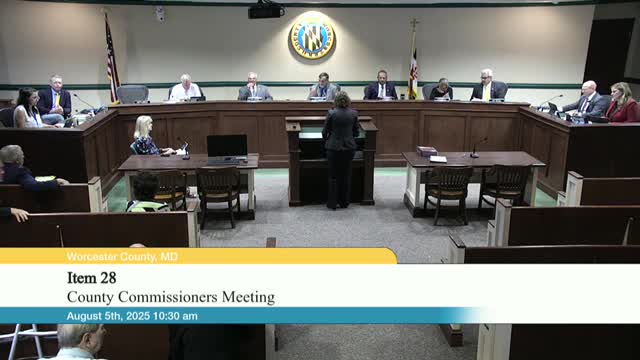Planning Commission Supports Rezoning Case 447 for Multifamily Development in Ocean Pines
August 05, 2025 | Worcester County, Maryland
This article was created by AI summarizing key points discussed. AI makes mistakes, so for full details and context, please refer to the video of the full meeting. Please report any errors so we can fix them. Report an error »

Under the bright lights of the Worcester County Commissioners' meeting room, a significant discussion unfolded regarding a proposed rezoning case that could reshape a portion of the community. The focus was on a 22.86-acre site located on Racetrack Road, adjacent to the Atlantic General Hospital outpatient facility. The applicants, Maryland Medical Owners 2 and 3, represented by Hugh Cropper, are seeking to change the zoning from C-2 General Commercial District to R-3 Multi-Family Residential District.
The Planning Commission's recommendation for this change stems from a perceived shift in the neighborhood's character, supported by nine key points from the applicant's testimony. The commission highlighted a growing demand for housing in the area, driven by population growth and redevelopment efforts, particularly in the nearby Ocean Pines subdivision. The commission noted that the proposed residential development would likely generate less traffic than commercial alternatives, a crucial consideration given the existing congestion on nearby roads.
As the meeting progressed, Commissioner Bertino inquired about the approval process should the rezoning be granted. The response outlined a multi-step procedure involving concept plans, technical reviews, and further approvals from both the Planning Commission and the County Commissioners. This thorough process is designed to ensure that all aspects of the development, including traffic management and environmental impact, are carefully evaluated.
Concerns were raised about the potential impact of the new development on the existing community, particularly regarding lighting, parking, and waste management. The planning staff assured the commissioners that residential developments would adhere to strict lighting standards to minimize disruption and that parking requirements would be set to prevent overflow into neighborhood streets.
Public comments were invited, and Hugh Cropper emphasized that the residential project would be less impactful than potential commercial developments, citing reduced noise, traffic, and light pollution. He argued that the project aligns with the county's comprehensive plan, promoting a transition zone between residential and commercial areas.
As the meeting concluded, the commissioners were left to ponder the implications of this proposed change. If approved, the development could not only address the housing demand but also redefine the character of the neighborhood, balancing growth with community needs. The outcome of this rezoning case will be closely watched by residents and officials alike, as it holds the potential to significantly influence the future landscape of Worcester County.
The Planning Commission's recommendation for this change stems from a perceived shift in the neighborhood's character, supported by nine key points from the applicant's testimony. The commission highlighted a growing demand for housing in the area, driven by population growth and redevelopment efforts, particularly in the nearby Ocean Pines subdivision. The commission noted that the proposed residential development would likely generate less traffic than commercial alternatives, a crucial consideration given the existing congestion on nearby roads.
As the meeting progressed, Commissioner Bertino inquired about the approval process should the rezoning be granted. The response outlined a multi-step procedure involving concept plans, technical reviews, and further approvals from both the Planning Commission and the County Commissioners. This thorough process is designed to ensure that all aspects of the development, including traffic management and environmental impact, are carefully evaluated.
Concerns were raised about the potential impact of the new development on the existing community, particularly regarding lighting, parking, and waste management. The planning staff assured the commissioners that residential developments would adhere to strict lighting standards to minimize disruption and that parking requirements would be set to prevent overflow into neighborhood streets.
Public comments were invited, and Hugh Cropper emphasized that the residential project would be less impactful than potential commercial developments, citing reduced noise, traffic, and light pollution. He argued that the project aligns with the county's comprehensive plan, promoting a transition zone between residential and commercial areas.
As the meeting concluded, the commissioners were left to ponder the implications of this proposed change. If approved, the development could not only address the housing demand but also redefine the character of the neighborhood, balancing growth with community needs. The outcome of this rezoning case will be closely watched by residents and officials alike, as it holds the potential to significantly influence the future landscape of Worcester County.
View full meeting
This article is based on a recent meeting—watch the full video and explore the complete transcript for deeper insights into the discussion.
View full meeting
